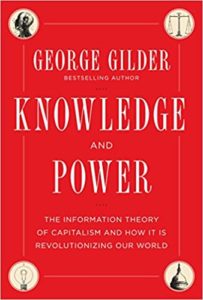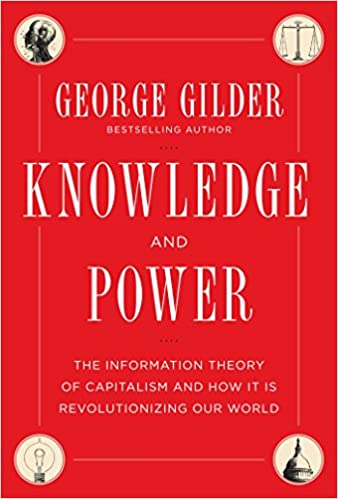
and of many others who are not in the top one percent.
I just finished being discussion leader of a colloquium on “Liberty and Power” in Fort Lauderdale. It was glorious to go into various establishments without wearing a mask. (I recognize that some of these establishments might have wanted to require masks and were prevented from doing so by the governor. I hope, but don’t know, that the ones I didn’t wear a mask in were ones that didn’t want to require masks.) And I had a great time. One of the readings was from a George Gilder book I hadn’t known of. It’s titled Knowledge and Power: The Information Theory of Capitalism and How It Is Revolutionizing Our World.
I particularly liked this excerpt:
Entrepreneurial knowledge has little to do with the certified expertise of an advanced degree from an establishment school. It has little to do with the gregarious charm of the high school student voted most likely to succeed. The fashionably educated and cultivated spurn the kind of fanatically focused learning undertaken by the 1 percent. Wealth all too often comes from doing what other people consider insufferably boring or unendurably hard.
The treacherous intricacies of building codes or garbage routes or software languages or groceries, the mechanics of butchering sheep and pigs or frying and freezing potatoes, the mazes of high-yield bonds and low-collateral companies, the murky arcana of petroleum leases or housing deeds or Far Eastern electronics supplies, the ways and means of pushing pizzas or insurance policies or hawking hosiery or pet supplies, the multiple scientific disciplines involved in fracking for natural gas or tapping shale oil or contriving the ultimate search engine, the grind of grubbing for pennies in fast-food unit sales, the chemistry of soap or candy or the silicon-silicon dioxide interface, the endless round of motivating workers and blandishing union bosses and federal inspectors and the IRS and EPA and SEC and FDA—all are considered tedious and trivial by the established powers.


READER COMMENTS
David Seltzer
Feb 6 2022 at 3:17pm
“and of many others who are not in the top one percent.” Yes! My father dropped out of high school at age fifteen to work on an ice wagon. Later after several jobs, he found employment At Inland Steel in 1940. He dug graphite and worked his way to electrician. He abhorred debt and thought social security was collectivism writ large. In 1952 he bought a small hardware store with money he saved. By 1972, his business grew to his first million dollars in revenue. The local steel mills were producing at historic rates. This brought more competing hardware stores to East Chicago. With margins thinning, my father decided to offer industrial supplies to the many steel mills, foundries and concrete plants in the Northwest Indiana region. His business grew by annualized compounded rates. He also bought a basket of stocks every month from a local stock broker who understood the power of compounding and portfolio diversification. All from a small uneducated kid from the Southside of Chicago. BTW. When he died, he left my mother and estate of nearly four million dollars.
David Henderson
Feb 6 2022 at 3:21pm
Wow! Great story, David. Thanks.
And I’m guessing, given your age, that he died some time ago, making that $4 million more like $10 or $12 million today.
john hare
Feb 6 2022 at 6:31pm
I don’t buy many books of this type anymore, but I just ordered this one on ebay.
David Henderson
Feb 6 2022 at 7:59pm
I read more of it on the airplane. It goes from really good to pretty sloppy. He picks a fight with Stigler about a famous Adam Smith quote and I think it was over nothing. Your mileage may vary.
John hare
Feb 7 2022 at 12:02pm
I’ll take my chances on a purchase that costs a lunch. Many of the points quoted resonated with me.
Phil H
Feb 7 2022 at 5:27am
I dunno, it just sounds like the standard “everyone loves to kick a teacher” shtick to me. Who are these “powers” that he’s complaining about? Teachers have made great efforts to adapt their teaching to the needs of the real world, with pupil-centric learning, project-based learning, flipped classrooms, shifting from theoretical to practical studies, and all the rest of the innovations that attract derision from certain sectors of the press. Teachers have tried and continue to try lots of different things, which often don’t work, but that’s not a problem of attitude.
mark
Mar 7 2022 at 4:00pm
Teacher here, plus father of school kids. 1. I hardly noticed the take on teachers, the quote’s focus is on what it takes to succeed as an entrepreneur. That school does not teach this, well, schools not even claim they do – except dedicated business-schools.
2. Attitude: I never thought teachers are not willing to teach (though hearing from Mexico/India/US in covid-time/ one might start to wonder). I do think (well, I know) our courses often do not prepare us for teaching.
3. Except of trying lots of stuff that does not work (or works worse/ or only under unusual circumstances), it would be nice to do the stuff that works. My kids have to learn “reading after writing” and “writing by talking” (Germany, yes, we are crazy). They have to “study foreign languages” at the age of 7 (that is my area of expertise, I know the studies and yes it is utter nonsense – I had to do that in Russia 1996. I shall never forget “Der Tiger ist krank. Er hat zu viel Schokolade gegessen.”) . Nowadays our primary schools must teach kids of two classes together. On paper that halves instruction-time, in real life it reduces schools to day-care.
The problem is not that teachers/curricula not tried so many things, but that they tried so many things.
Dylan
Feb 7 2022 at 8:38am
I agree that is sometimes comes from these things, and that is a fact to be celebrated. I’d quibble with the “all too often” part of the statement though, and say it doesn’t come that way quite often enough. Wealth also comes many times from being in the right place at the right time, knowing the right people, navigating the insufferably boring aspects of the tax code to find the loopholes big enough to make a business out of, lobbying the right politicians, operating in a protected industry, etc…
Now, not all of these are bad in and of themselves, some are good. Finding loopholes in the tax code should provide incentives to simplify it for instance. But, they also tend to be zero or negative-sum. That’s something I am less inclined to celebrate.
David Henderson
Feb 7 2022 at 3:30pm
You wrote:
Good point.
You wrote:
All true. I think in context it was clear that Gilder was not celebrating these things.
Vivian Darkbloom
Feb 8 2022 at 3:19am
“All true. I think in context it was clear that Gilder was not celebrating these things.”
Gilder’s attempt at a fancy literary style may be getting in the way of clear communication. He employs a very long periodic sentence consisting of a long list separated by commas (“asyndetic coordination” is the literary term) in which the relation of each item in the list is not grammatically and contextually complete until the phrase —“all are considered tedious and trivial by the established powers.”
The last part of that long list is comprised of:
“…the endless round of motivating workers and blandishing union bosses and federal inspectors and the IRS and EPA and SEC and FDA.
I took this to mean, in context, (that is, as part of his long list) that he was referring exactly to what Dylan has suggested (finding loopholes, lobbying, etc). What else would “blandishing” the IRS and EPA and SEC and FDA otherwise mean?
That’s not to say that I disagree with the general idea that “entrepreneurial knowledge” consists, mainly, of what our most “educated” would consider mastering rather mundane problems. I also don’t consider the quoted sentence to be (quite) “gobbledegook”. However, I do think that Gilder would have served himself and his readers better if he had chosen a “style” better suited to the idea and intent in his mind. In trying to create a long list, he appears at the end to have lost his train of thought.
David Henderson
Feb 8 2022 at 9:45am
Good point.
Alan Goldhammer
Feb 7 2022 at 1:23pm
The quoted passage reads like gobbeldygook. Perhaps in context it might mean something but given that Gilder went off the rails some decades ago (he was a major believer in supply side economics, is an anti-Darwinist, and his book ‘Sexual Suicide’ that I read when it came out and had a great deal of difficulty containing laughter at its thesis convinced me that he should never be taken seriously). Maybe he gives a good deal of thought to what he writes, but I’m quite doubtful given what I’ve read
David Henderson
Feb 7 2022 at 3:28pm
You wrote:
In what way?
You wrote:
I think he’s in and out. Some passages, like the one quoted, are great. Other passages are not great. See my response to John Hare.
GL
Feb 8 2022 at 11:59am
“Wealth all too often comes from doing what other people consider insufferably boring or unendurably hard.”
Great quote, but old idea.
“Opportunity is missed by most people because it is dressed in overalls and looks like work.” – Thomas Edison
“Time management is pain management” -unknown
David Henderson
Feb 8 2022 at 12:10pm
Great quote from Edison. Thanks.
Comments are closed.